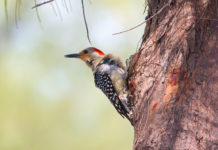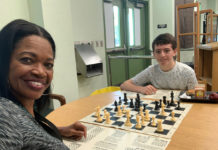Writer Jonathan Woods moved from Dallas to Key West several years ago to continue his writing career. Both his collection of short stories and his first novel have received favorable reviews. Florida author and writer of the long-running, award-winning Harry Bosch crime series, Michael Connelly wrote in his blurb for Woods’ short story collection Bad Juju & Other Tales of Madness and Mayhem, “Quirky and disquieting… leaves you marveling at the imagination of Jonathan Woods.” For Woods’ recently released crime novel A Death in Mexico, Connelly blurbed, “…a great and telling ride south of the border into madness and mayhem. I loved it.” Let’s find out a little more about this writer Jonathan Woods, in his own words.
Q: You recently had a fantastic review in the Los Angeles Review of Book for A Death in Mexico, your new crime novel. The reviewer mentioned a few genres the book fit into, mystery being one. What genre do you feel you write in?
A: I write pulpy crime stories with a literary twist. Crime stories covers a pretty broad waterfront from Dostoyevsky’s Crime and Punishment, about an axe murderer, to Agatha Christie’s “cozy” style detective stories starring Hercule Poirot or Miss Marple to American hardboiled crime stories from classic masters like Dashiell Hammett, Raymond Chandler and James M. Cain to today’s top crime story writers such as Michael Connelly, James Lee Burke and Elmore Leonard. My novel A Death in Mexico is a police procedural about a murder investigation in San Miguel de Allende, Mexico. The reviewer for the Los Angeles Review of Books thought A Death in Mexico derived more from the works of Henry Miller and Graham Greene than Raymond Chandler. I’m a fan of all three of these great writers, so I’m not complaining about the comparisons.
Q: The Los Angeles Review of Books reviewer hoped to see another book featuring your Mexican police investigator Inspector Hector Diaz. Is that a possibility?
A: Inspector Hector Diaz, the police detective hero of A Death in Mexico, was a fascinating character to write about and definitely deserves a sequel. The politics and history of Mexico continue to fascinate me. It’s a deep cenote (sinkhole)pool from which to draw material for crime stories. At the moment, however, I’m 35,000 words into a road trip crime novel (working title The Big Score) that follows some crazed gringos from Atlanta to Orlando to Miami to Mexico and back to Key West. When that’s done, I’ll revisit Inspector Diaz.
Q: As mentioned in the intro, both your books received favorable blurbs from Michael Connelly. That has to make you feel good. How’d you get someone as busy as Connelly to read an unknown writer’s work?
A: I met Michael Connelly back in 2009 at a small conference of crime story writers and fans held in Panama City, Florida and put together by the writer Michael Lister. Michael Connelly was the guest of honor. Michael is very supportive of beginning writers but he doesn’t treat lightly requests for blurbs. He’s very specific that he will only blurb a book that he has read and likes. I count myself very privileged to have received blurbs from him for both my books.
Q: Your first book, Bad Juju & Other Tales of Madness and Mayhem, a collection of crime short stories, also received acclaim. Do you prefer writing the novel or the short story and why?
A: Bad Juju & Other Tales of Madness and Mayhem caused quite a stir when it was published in 2010. It went on to win a 2011 Spinetingler Award for Best Crime Short Story Collection. Some critics have referred to my style of writing in Bad Juju as gonzo noir. The writing of Bad Juju was a breakthrough for me. Before Bad Juju I’d written a novel that no one wanted to represent or publish. Some of the stories in Bad Juju were first published on the web in literary magazines like 3:AM Magazine, Plotswithguns.com and Thuglit.com. Next thing I knew, I had a book of stories and a publisher, New Pulp Press. As a result of this history, I have a great fondness for the short story form. There’s something thrilling about working on a story for a few weeks, polishing it into a lustrous final product. A novel takes a much greater commitment but it also allows for the telling of a much more intricate and deeper story. Ultimately I love both forms. I have a new collection of noir crime stories that should be appearing soon. The working title is Phone Call from Hell & Other Tales of the Damned. And, as mentioned earlier, I’m also in the middle of writing a new crime novel.
Q: You’re a recovering attorney, last state of practice being Texas, so how did you end up in Key West?
A: Yes, I was an attorney for many years doing deals for a multi-national high-tech company. I left that line of work a few years back to start writing. From that point it took me about seven years before my first book, Bad Juju & Other Tales of Madness and Mayhem, was published. During that time my spouse and I lived in Dallas, Texas, where she opened an art gallery. I helped out in the gallery in between my struggles to learn the craft of writing. Then the big recession hit and people stopped buying art. We were both tired of the big city and decided Key West was the perfect alternative, a small town with a thriving cultural community: music, an art cinema, plays, writers, artists, great restaurants, a cultural history reaching back to Hemingway and Wallace Stevens and Hart Crane. And I love that you can ride your bicycle everywhere. So here we are.
Q: Do you find your creativity more active in Key West or do you feel you can write wherever you are?
A: The task of writing books is not about being in a particular place. It’s about being meticulously focused on the words on the page, on the rhythm of the words and the pictures they convey in the mind. But place is an important part of every story. My stories in Bad Juju are set in many different locations: from Venice to Mexico to Tokyo, from the Caribbean rim to the south Texas scrub. All places I have been. Key West is a great place to live for writers because of its great writer vibe created by its long literary heritage from Hemingway to Tennessee Williams and Elizabeth Bishop to Philip Caputo, Tom McGuane, John Leslie and Robert Stone, to name a few. More importantly exotic Key West is a perfect backdrop for tales of murder and mayhem and I expect Key West will appear more and more as a location for my stories. My most recent crime short story “A Lucky Man” is a tale of bone fishing, lust and murder set in Key West. It, along with stories by seven other Key West crime writers, will appear in the anthology Murder in Key West and Other Island Mysteries coming soon from AbsolutelyAmazingeBooks.com
Q: When did you first know you wanted to be a writer? Where were you at the time?
A: Growing up, I was hauled from one side of the country to the other and back again. We moved every two or three years from Rhode Island to L.A. to western Massachusetts to Ohio. You name it; I’ve lived there. As a kid that always meant I was the outsider. So early on I became fascinated with books. They were the one constant, the one loyal friend in an always-changing environment. Reading was my great escape. Adventure stories, science fiction and later crime fiction and literary novels. As an undergraduate at McGill University I was an English lit major. I think it was inevitable, after reading all those books, that I would try my hand at writing one or two.
Q: What is your daily writing schedule and do you set goals for each day, like the number of words you must get down? Have you tweaked the daily schedule/goals over the years?
A: When I’m deeply involved in writing a novel or story, I try to be disciplined about the process. That means writing for 3 or 4 hours five days a week. Obviously I don’t achieve that all the time. Life has a way of getting in the way of our best intentions. At the other extreme, the writing thing can become a bit obsessive and when a story is really going well, I have a hard time breaking away. So although I may put in 3 or 4 hours in an afternoon, I find myself back at it from ten to midnight, with my spouse asleep in the other room. Or I’ll wake up in the middle of the night with some crazy scene or clip of dialogue in my head that I have to scrawl down on paper before it disappears forever.
Q: Every writer seems to think his/her way of writing is ideal. What about you? Do you outline, story board, think the ideas out in your head? How does your story make it from you to the page and does it change from your original ideas?
A: Mostly I start out with a character that interests me and see where that character takes me. Sometimes I know the ending of a story before I start writing, sometimes not. For a novel I do some outlining, some jotting down of ideas, plot points, characters, scenes. But for me writing a story is a process that is always in a state of flux and evolution, until at last you turn a corner and see the end. Probably deep in my mind the story I’m working on is a lot more developed than in my consciousness. But writing for me has always been a mystical experience as far as where the story and the characters come from. Of course, the hard part is getting the right words on paper.
Q: Some writers seem to enjoy rewriting, while others hate it. Where do you fit in? How much editing is done after you’ve finished and does it require you to rewrite sections of the book?
A: Rewriting is part of the craft. When I’m working on a story, each day as I add knew material, I constantly return to the earlier pages, changing a word or phrase, adding or deleting descriptions or dialogue, making sure that the words flow off the page like music. When a story finally seems done, I set it aside for a few weeks and then go back to it, to smooth out the rough edges that I missed before.
Q: What was the best writers’ conference you attended this year and would you recommend conferences for unpublished writers. What do you, a published writer, get from attending such conferences versus an unpublished writer?
A: There are really two kinds of writers’ conferences. One kind are those attended by both writers and fans of a particular genre of writing. For a writer these events are all about networking and getting your name out there. In the crime fiction genre the most important conference is called Bouchercon. It’s held in a different city every year. In 2012 Bouchercon was held in Cleveland, Ohio and had more than 1,500 attendees, including yours truly, who appeared on a writers’ panel, gave a reading and partook of various alcoholic beverages. Events like Bouchercon and smaller regional writer/fan gatherings are great fun whether you’re a published writer, an aspiring unpublished writer or just a fan of good books in the particular genre. The second kind of writers’ conferences focus on the craft of writing and are attended by aspiring writers and a smaller group of established writers who act as mentors. Two of the most famous writers’ conferences of this type are Bread Loaf Writers’ Conference at Middlebury College in Middlebury, Vermont and Sewanee Writers’ Conference at Sewanee: The University of the South in Sewanee, Tennessee. I had the honor of attending both of these writers’ conferences in 2005, long before my first book was published. Attending a craft focused writers’ conference is an amazing, eye-opening experience for an unpublished writer. The Key West Literary Seminar held each January is a combination event focusing in the first week on fans, famous writers and a particular literary theme, and in the second week on workshops for aspiring writers.


























